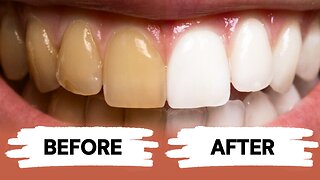Premium Only Content

Forget LDL – Focus on Remnant Cholesterol – Dr. Berg
LDL cholesterol isn’t a good indication of mortality risk, but remnant cholesterol is.
Timestamps:
0:00 Forget LDL cholesterol and pay attention to remnant cholesterol
0:45 Remnant cholesterol is the plasma in your blood that’s not HDL or LDL
1:11 This is the remnant cholesterol rating system to determine if you’re at risk
1:45 Your body creates too much risky remnant cholesterol because of these factors
I want to introduce you to something called remnant cholesterol. It’s a more accurate indication of mortality risk than LDL cholesterol. You can look up a gentleman named Dave Feldman, who has done a significant amount of research on this topic.
There’s so much emphasis on LDL cholesterol being the “bad” cholesterol, but remnant cholesterol is way more important! Not only is it a better indication of mortality risk, it’s way more atherogenic; that is, it creates plaque and problems in your arteries.
Remnant cholesterol is the plasma cholesterol — that is, the plasma in your blood — that’s not HDL or LDL cholesterol. You may think that total cholesterol is the combination of HDL and LDL cholesterol, but it’s not. And the way to find your remnant cholesterol is to subtract your HDL and LDL cholesterol amounts from your total cholesterol amount. Then compare your result against this scale:
● Less than 17 is optimal
● 18-23 is okay
● 24-29 is concerning
● Greater than 30 is very concerning
If you have too much sugar, carbohydrates, or insulin, your body will create a lot more remnant cholesterol. Another way to look at it is that you have too much concentrated, stored energy that spills over and results in remnant cholesterol.
When you get your cholesterol test results, it’s important to do the calculations to find out your remnant cholesterol amount. This helps you look at the big picture and understand what’s happening in your body. Don’t simply focus on your LDL cholesterol score.
Talk to a Product Advisor to find the best product for you!
Call 1-540-299-1556 with your questions about Dr. Berg's products. Product Advisors are available Monday through Friday 8am-6pm and Saturday 9am-5pm EST.
* At this time, we no longer offer Keto Consulting and our Product Advisors will only be advising on which product is best for you and advise on how to take them.
Dr. Eric Berg DC Bio:
Dr. Berg, age 56, is a chiropractor who specializes in Healthy Ketosis & Intermittent Fasting. He is the author of the best-selling book The Healthy Keto Plan, and is the Director of Dr. Berg Nutritionals. He no longer practices, but focuses on health education through social media.
Follow Me On Social Media:
Facebook: https://bit.ly/FB-DrBerg
Instagram: https://bit.ly/IG-DrBerg
Anchor: https://bit.ly/Anchor-DrBerg
TikTok: https://bit.ly/TikTok-DrBerg
DR. BERG'S SHOP: http://shop.drberg.com/
Send a Message to his team: https://m.me/DrEricBerg
ABOUT DR. BERG: https://www.drberg.com/dr-eric-berg/bio
Disclaimer:
Dr. Eric Berg received his Doctor of Chiropractic degree from Palmer College of Chiropractic in 1988. His use of “doctor” or “Dr.” in relation to himself solely refers to that degree. Dr. Berg is a licensed chiropractor in Virginia, California, and Louisiana, but he no longer practices chiropractic in any state and does not see patients so he can focus on educating people as a full time activity, yet he maintains an active license. This video is for general informational purposes only. It should not be used to self-diagnose and it is not a substitute for a medical exam, cure, treatment, diagnosis, and prescription or recommendation. It does not create a doctor-patient relationship between Dr. Berg and you. You should not make any change in your health regimen or diet before first consulting a physician and obtaining a medical exam, diagnosis, and recommendation. Always seek the advice of a physician or other qualified health provider with any questions you may have regarding a medical condition.
Thanks for watching! Remnant cholesterol is a more accurate gauge of your health risk than LDL cholesterol is.
-
 5:48
5:48
Dr. Eric Berg
1 day agoTeeth Whitening at Home
5.77K8 -
 11:51:52
11:51:52
Right Side Broadcasting Network
7 days agoLIVE REPLAY: Inauguration of the 47th President Donald Trump, and Presidential Parade - 1/20/25
1.3M572 -
 4:25:55
4:25:55
Kimberly Guilfoyle
14 hours agoLive Inauguration Day Coverage
191K66 -
 1:06:10
1:06:10
LFA TV
1 day agoThe Return of 45 | TRUMPET DAILY 1.20.25 7pm
99.3K1 -
 1:50:51
1:50:51
2 MIKES LIVE
10 hours ago2 MIKES LIVE #169 Inauguration Day Special!
65.4K12 -
 1:58:10
1:58:10
Quite Frankly
14 hours ago"The Inauguration Day Call-in Show" 1/20/25
60K13 -
 1:13:26
1:13:26
The Big Mig™
11 hours agoTrump’s Back!
59.7K13 -
 1:06:36
1:06:36
The Rubin Report
14 hours agoNo One Expected These Brutal Moments in Trump’s Inauguration Speech with Co-Host Sage Steele
148K150 -
 8:34:54
8:34:54
Dr Disrespect
17 hours ago🔴LIVE - DR DISRESPECT - DELTA FORCE - STARFALL NEW SEASON
142K22 -
 1:58:31
1:58:31
Revenge of the Cis
13 hours agoEpisode 1432: Take Two
81.6K27